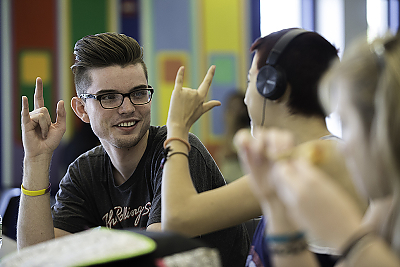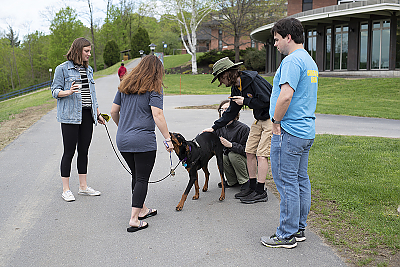One of the many things that make Landmark College a better choice for students who learn differently is that we constantly strive to provide the right kind of support for the wide profile of learners that come to the College. In this spirit, we have developed an early orientation designed for students who need extended support transitioning to college.
Early Orientation
The schedule for enhanced orientation consists of the following:
- Prearrival Interview—You and your family will have the opportunity to participate in a comprehensive interview with a member of the Social Pragmatics team. These interviews will serve as the basis for how we work with you when you arrive. Students and parents will be contacted separately to schedule a meeting. Parent interviews are usually an hour, student meetings tend to be briefer. We start setting up interviews after June 1, 2024. Students have the option of continuing regular check-ins until arrival.
- Specialized Roommate Selection—You will receive additional review to determine appropriate and effective housing and roommate assignments. We don't always hit a home run, but based on the information we receive, we try to make the best possible roommate matches.
- Educational Planning Process—You will participate in an online meeting with a member of the advising team to discuss your educational and personal goals. This person-centered planning process will also help us know you better so we can better support you. A graphic chart of the process will be available for students and advisors to refer to throughout the year.
- Peer Group Development (Students)—You will be invited to online social groups starting July 8, 2024. This will help in the development of a safe and comfortable peer group as you get ready for the full orientation program and the semester. These groups continue until arrival on campus. The groups are a mix of social and informational about life on campus. Students can choose the activity/groups that they want to attend. Students are notified of these activities via their Landmark e-mail accounts.
- Parent Workshops—Parents are invited to attend evening online workshops during the academic semester. We will be reviewing social pragmatic programming, including PEERS®, workshops, activities, and social coaching. Workshops are scheduled Tuesday evenings from 6pm-7pm ET. The sessions are recorded. Early Orientation sessions for parents will take place on Tuesday, June 25th, July 22nd, and August 13th.
- Priority Application to PEERS®—Program for the Education and Enrichment of Relational Skills (PEERS®) is weekly evidence-based social skills intervention for motivated students, who are interested in learning skills to make and keep friends and develop romantic relationships. During each group session, students are taught important relational skills and are given the opportunity to practice these skills. Academic Advisors will enroll students in PEERS® during course registration.
- Early Arrival, (Registration and Move-in)—Students arrive on campus Wednesday, August 21, 2024—one day prior to the arrival of the new student cohort. Students will complete the check-in process and have time to settle into their dorm. Social activities are scheduled for students. Parents are invited to participate in afternoon workshops. Students and families will have the opportunity to check in with social pragmatic staff throughout the day. On Thursday, students and parents will join new student orientation activities with the remainder of the incoming students and their families.
PEERS®
Program for the Education and Enrichment of Relational Skills (PEERS®) is a weekly evidence-based social skills intervention for motivated students, who are interested in learning skills to make and keep friends. During each group session, students are taught important social skills and are given the opportunity to practice these skills. PEERS® is a semester long program. Students enroll in PEERS® during course registration with their academic advisor. Already Registered for classes? No problem. Just let your academic advisor know you want to include PEERS® in your course schedule.
What sets the PEERS® program apart is its foundation in evidence-based practices. The concrete skills help you make and keep friends with people you want to be friends with, and/or date people you want to date. Learn more about it by clicking here. PEERS® is not intended to be a friendship-matching group. Rather, it's a program in which you will learn skills to help you make friends. However, Some of the people in your group may become your friends because of the shared experience.
Many of our students feel like they already possess the skills presented in the PEERS® sessions. For you, the value of these discussion-based sessions will be in practicing these skills within different situations and with different people. Through that sharing of knowledge, you can teach other students something new and possibly learn something that will help you feel even more confident.
PEERS® Plus
Many students completing PEERS® enjoy the opportunity to get together with a group of PEERS® graduates to practice the Behavioral Rehersals, roleplays, and get togethers they experienced during the PEERS® sessions. This group is for PEERS® graduates only and is led by a certified PEERS® instructor. Students review the PEERS® rules and steps and practice the specific skills. Participation in this group does not require registration.
Healthy Relationships
This weekly drop-in discussion-centered group focuses on the more nuanced aspects of relationships. Topics include but are not limited to: Boundaries, Consent, Mental and Physical Wellness, and Trust and Safety. Healthy Relationships is hosted by neurodiverse Social Pragmatics staff members on campus and on-line. During the semester, topics may change depending on the interests of the student participants.
College to Careers
During the Spring semester, as students prepare for summer jobs and internships, we partner with Career Connections to offer a series of discussion and instructional sessions on workplace behavior. Topics include interacting with colleagues, appearance, informal expectations, phone use, etc.
Dating Boot Camp
Based on the PEERS® sessions for Young Adults on dating and romantic relationships. These Sessions include "How to Tell Someone You Like Them," "Asking Someone on a Date," "Going on Dates," "Dating Do's and Don'ts." We offer these sessions seperate from the PEERS® series as our experience has been that many of the PEERS® students are not interested in dating, especially during their first semester on campus, but are seeking this instruction later in their Landmark Career.
Social Pragmatics offers staff-supported activities online as well as on and off-campus. All Social Pragmatics-sponsored activities are open to all college students. These include Thursday and Saturday trips and activities and weekly hybrid (on-line and on-campus) offerings. Thursday trips take place after dinner to local Keene, NH or Brattleboro, VT venues. Monthly we offer a Thursday activity on-campus and free of charge. Saturday trips are day-long excursions. In 2023 these included the Vermont Institute for Natural Science, MassMOCA, the Basketball Hall of Fame, and the Smith College Botanical Gardens.
Social Table
On-campus students are welcome to join the Social Pragmatics table in the Alumni Dining Hall. The table welcomes anyone interested in sitting with the group for lunch or dinner, Monday thru Friday. The table is facilitated by Social Pragmatics professional staff and student employees. This is a great place for students to practice conversation skills and get to know other students.
Student Employment
We encourage students to get engaged through service activities and employment. Social Pragmatics offers student employment as PEERS® Assistants (supporting the instructors), Social Table Hosts, Event and Activity Support, Coffee Shop hosts (Davis Hall), and Game Night and discussion group hosts.
Study Abroad in Germany
Consider joining the Berlin Study Abroad Program. This is a Landmark College Study Abroad PLUS Program and is designed with the needs of autistic students in mind—but the program is open to everyone. Extra support on the program makes it an ideal program for first-time travelers or students who thrive in an environment with consistency and structure. For more information on Study Abroad PLUS, please see the “Program Details” section on this page: Berlin Study Abroad Program
Social Coaching
Social coaching is included for all students enrolled in PEERS® (PEERS001/003). Students may elect to continue working with their social coach throughout their time at Landmark College after the completion of the PEERS® sessions. Social coaching includes reviewing the steps and rules of the weekly PEERS® session, practicing the PEERS® behavioral rehearsals, making a plan to engage in campus activities, and reviewing any challenges that impeded the student from completing the PEERS® homework.
Students not in the PEERS® program who are managing situational social challenges can request meetings with a social coach depending on availability.

